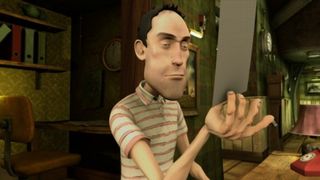
As BBC Scotland's new CG-animated sci-fi sitcom One Star makes its debut tonight, SFX talks to its creators...
How did you end up making a CG-animated sci-fi sitcom?
David Murdoch [producer]: We were looking to do a sitcom, and Garry Marshall, the director, had already made something called Rogue Farm which was hard sci-fi. It was a passion area of his at the time, so I wanted to continue with that, so we thought, “Let’s try to come up with something that’s sci-fi.” And we got talking about strange and wonderful experiences of going to B+Bs in the Scottish highlands, and then somehow made the leap to go, why not get a B+B in space, the worst one. The title of One Star just seemed to make perfect sense. It’s a one-star hotel and it’s one star in space.
It’s pretty grown up material, though, isn’t it?
DM: It is post-watershed, yes. We’re looking at the success of Family Guy and thinking, can we try and hit that demographic. That’s kind of where we’re at with it, but in a nice way, We don’t want to take it too far.
Garry Marshall [director]: I’d probably rather reference South Park, personally. I’m more a South Park kind of person, I guess. The type of humour, and the way it’s depicted – I wouldn’t show it to my kids, let’s put it that way! It’s not Disney or Pixar, definitely not, but that’s what’s been quite fun about it. Hopefully when it does go out people will just be like, wow this looks really good, really high quality, great animation, and then they’ll just buy into the story and the characters and not really think about what a strange thing it is that they’re watching.
Animation’s traditionally been seen as a medium for kids. Do you think that’s changing?
GM: Yeah. I think there have been lots of attempts at doing it. Some have been more or less successful than others, obviously Family Guy and South Park are examples of things that have been really successful, but I think the problem’s not that there’s not an audience or an appetite to do it, I think it’s more that it’s more expensive to make than other types of programming. And a lot of the time you’re dealing with c
ommissioners who are maybe not animation fans and don’t really embrace it like that. But with the huge audiences for animation right now, and certainly the science fiction community and so many people who go out everyday who buy manga comics and anime films and all that stuff, that there’s nothing homegrown that caters for those tastes, just seems like a bit of a wasted opportunity.
Does being in space give you plenty of freedom in terms of storytelling?
DM: I think Garry’s been able to get lots of animators who’ve been just desperately trying to get on the project, because it’s not something they get the opportunity to work on a lot. We’re trying for a bit of satire as well.
One Star’s made in Scotland for BBC Scotland. Is it made with a Scottish audience in mind?
DM: We’re trying for a universal appeal. Everyone’s been to a bad hotel or a bad B+B and experienced difficulties at these kind of places and this is just an amplification of all that.
GM: It’s really not aimed at all at a Scottish audience. That’s not to say it’s not Scottish – we’re Scottish and part of BBC Scotland’s remit is to make programmes that are appropriate and appeal to a Scottish audience – but it’s not as Scottish as a lot of comedy programmes that have come out. The main characters are Scottish, but we’ve deliberately given them what we think are quite easy to understand accents – they’re not from Glasgow or anything like that. When you make programmes and live with them in Scotland you’re slightly aware that it might be seen as being a bit local and parochial, just for the local kind of market, but that’s not really the intention here at all.
So is it Fawlty Towers in space?
DM: We’re trying not to say it’s Fawlty Towers, we don’t want to think of it like that. I prefer to think of it as a messed up sci-fi equivalent of Family Guy.
One Star airs on BBC2 Scotland tonight at 10pm.


